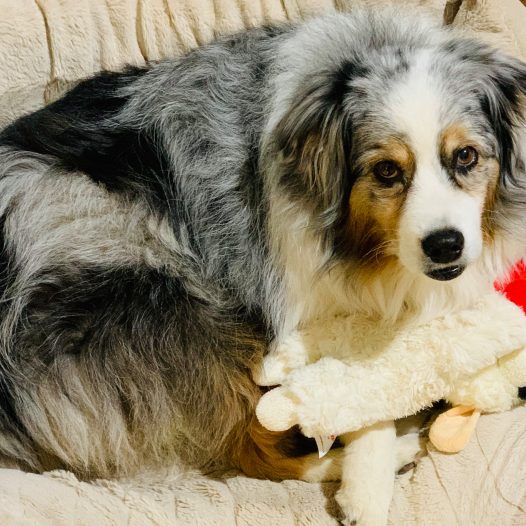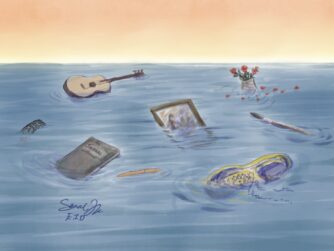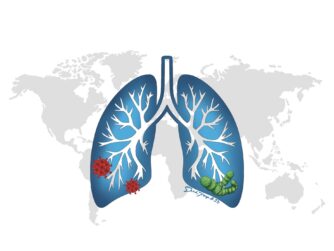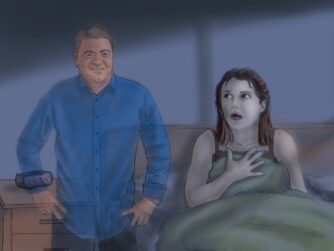Marianne Matzo, PhD, APRN – Podcast Host
I met Dimple Rose two years after her mother died. It was a sudden illness and quick death that left the whole family reeling. Dimple Rose did not really understand where her mother was. She visited mom in the hospital a few times and was able to cuddle with her in bed but always returned home with her father. Everyone moved through the funeral in a fog and Dimple felt sadness all around her.
When I met her, I had started to date her dad and she struck me as a very sad dog. I guess I should tell you Dimple is an Australian Shepherd who at the time was 12 years old. We went for a walk and Dimple Rose went about a block and turned around to go home. She walked slowly and seemed to have little enthusiasm.
David brought her to my house and Dimple snuggled a bit with my college aged daughters. It really was the first spark I saw in her and seemed as though she missed having women around. Her mom took her everywhere, and at the start of Dimple’s life their daughter was living with them. Dimple seems to prefer women. She likes hanging out in the kitchen, going to the bedroom to “read a book” (which means she gets to jump on the bed and snuggle).
I married her dad and she is now 14. She has arthritis in her legs, so she limps. Her mom always kept her on a strict dog food/no people food diet. I am now her stepmom and I discussed with David adapting principles of palliative care in our treatment of Dimple. My suggestions focused on three things, pain management, grief work, and food.
Dimple had been on pain medication with low doses and regular blood work because of its potential effects on the liver. Given that the average lifespan for an Australian Shepherd is about nine years, her mom’s strict care paid off. But now, she had arthritis in her joints, and one of her favorite activities, going for a walk, was a painful experience. I have had discussions with families in my work as an Advance Practice Palliative Care Nurse Practitioner about balancing risk v benefits and considering quality of life when it comes to any treatment choice. So, we decided to aggressively manage her pain and stop the blood work to check her liver (knowing she was too old to treat any secondary liver disease).
We conveyed this decision to her Veterinarian, and she started her on a stronger pain medication. I also added CBD to her daily routine to help with inflammation and joint mobility. Within a month she was running, chasing a stick, and playing ball. This summer she has decided that she must wade into any body of water she sees. We live on a lake, so she is wet a lot. David had said he never saw her swim, but this summer she waded out far enough that she lifted her feet and swam back. That seemed to make both Dimple and David happy.

Second on my list was grief work. I knew Dimple Rose was very smart and had a good vocabulary, so when we went to ‘read a book’ I would talk with her about how much she must miss her mom. I told her all about what had happened and that her mom never would have left her if she did not have to. I did this regularly and eventually she would come and snuggle with me, let me kiss and hug her (she used to move away if I were too affectionate). This summer she has started to jump on the bed and snuggle after she finishes her breakfast. I could not figure out why she would suddenly start to do this until I asked David about it. Apparently, this was a behavior she had with her mom and was now doing with me. That makes me happy.
Lastly was food. Dimple Rose loves food and watches everything we eat. I talked with David about the concept of ‘recreational eating’ (for more on this listen to the food and fluids podcast). Basically, it is eating for fun. Dimples still has her nutritional dog food twice a day, but we are far more liberal with snacks. She loves crackers, French fries, and any other carbohydrate that comes her way. I give her pills wrapped in a piece of donut, cheese, or hot dog. Dimple Rose loves this part of her treatment plan.
I would say Dimple Rose is a happy woman again. She has females in her life, her pain is managed so she can do the activities she enjoys, and she has variety in her diet. I know she is in the last stage of her life and that makes me very sad. I like her, even though she tries to herd me to bed at 8:00 and then bark at me when I do not comply. I feel so blessed to be her stepmom and to have been able to help her feel better. She was the first dog I was aware of to be grieving and talking with her about it seemed to help.
As I was working on this week’s podcast about the death of our pets, I had a hard time focusing on it. I kept thinking about Dimple dying and that I was not ready for that to happen. I have not had enough time with her (but we never have enough time with the people we love). Now that you have met her, I will be sure she checks in with you every now and then. I will also remind myself that every day I have with Dimple Rose is a gift.









Thank you for sharing Dimple Rose’s heartwarming story. It’s evident how much love and care you and David have put into making her senior years joyful and comfortable. Your approach to pain management, addressing her grief, and allowing her some indulgence in food has clearly made a positive impact on her well-being. It’s a beautiful reminder of the special bond we share with our pets and the lengths we’ll go to ensure their happiness.